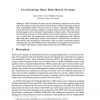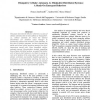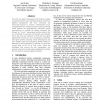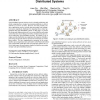136
click to vote
PSTV
1989
15 years 3 months ago
1989
This paper proposes design concepts that allow the conception, understanding and development of complex technical structures for open distributed systems. The proposed concepts ar...
115
click to vote
SAC
1998
ACM
15 years 6 months ago
1998
ACM
Coordination languages have recently been attracting signi cant attention as a means of programming parallel and distributed systems. The approach of separating coordination from ...
104
click to vote
ASIAN
1998
Springer
15 years 6 months ago
1998
Springer
LOTOS is a formal specification language, designed for the precise description of open distributed systems and protocols. Our purpose is to introduce the operators of logics (for e...
120
click to vote
FTDCS
1999
IEEE
15 years 6 months ago
1999
IEEE
Open Distributed Systems are the dominating intellectual issue of the end of this century. Figuring out how to build those systems will become a central issue in distributed system...
139
click to vote
PDP
2003
IEEE
15 years 7 months ago
2003
IEEE
This paper describes the behavior observed in a class of cellular automata that we have defined as "dissipative", i.e., cellular automata for which the external environm...
107
click to vote
ATAL
2004
Springer
15 years 7 months ago
2004
Springer
The Grid and agent communities both develop concepts and mechanisms for open distributed systems, albeit from different perspectives. The Grid community has historically focused o...
107
click to vote
COORDINATION
2005
Springer
15 years 7 months ago
2005
Springer
In the context of open distributed systems, the ability to coordinate the agents coupled with the possibility to control the actions they perform is important. As open systems nee...
109
click to vote
COMPSAC
2007
IEEE
15 years 8 months ago
2007
IEEE
Building open distributed systems is an even more challenging task than building distributed systems, as their components are loosely synchronised, can move, become disconnected, ...
156
Voted
CCS
2009
ACM
15 years 8 months ago
2009
ACM
Open distributed systems such as service oriented architecture and cloud computing have emerged as promising platforms to deliver software as a service to users. However, for many...
148
click to vote
LATIN
2010
Springer
15 years 8 months ago
2010
Springer
Topological self-stabilization is an important concept to build robust open distributed systems (such as peer-to-peer systems) where nodes can organize themselves into meaningful n...




